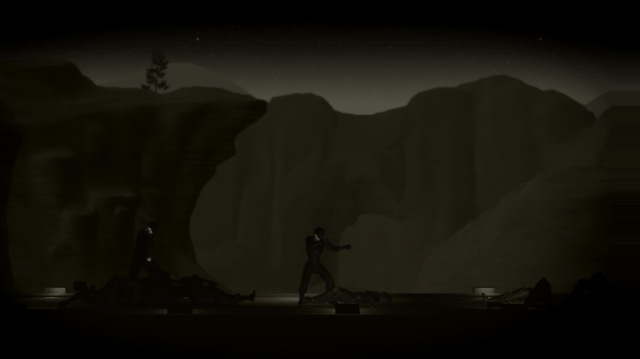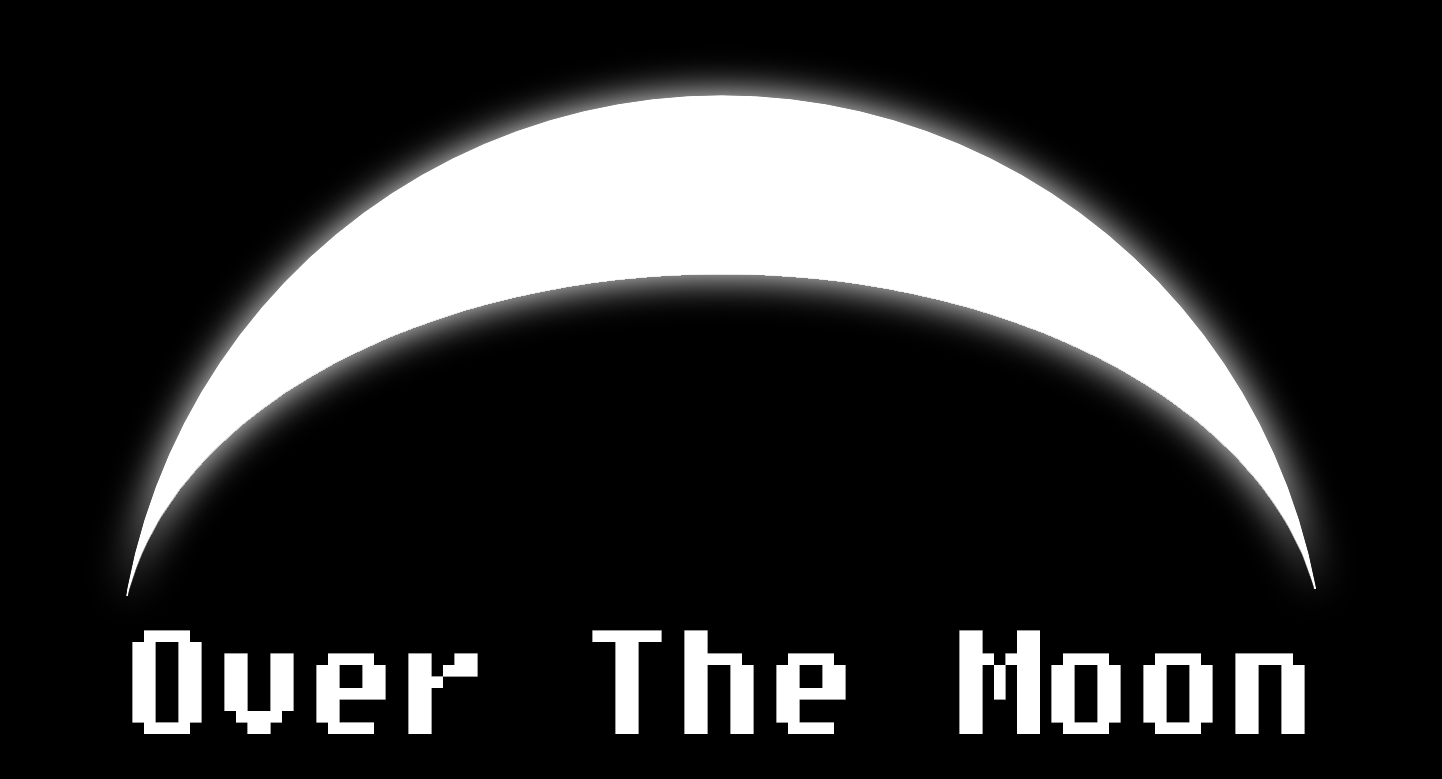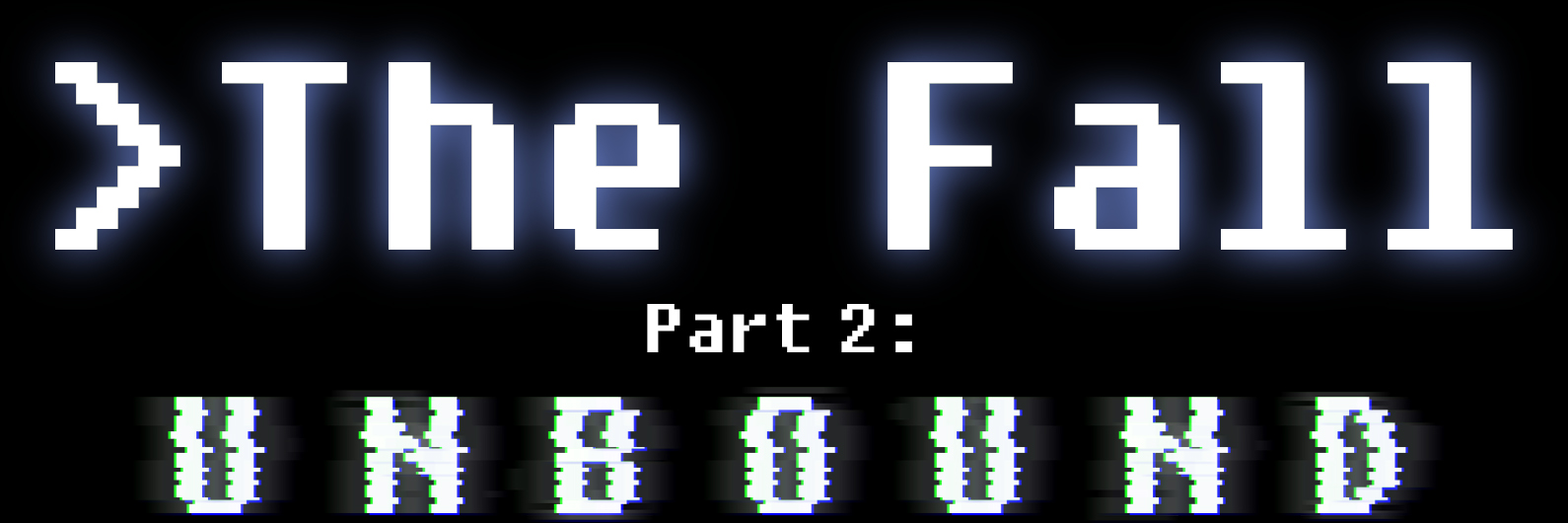The biggest shock for me at EGX this year was seeing a familiar name, one that I actually didn’t think I would see again, that name was, The Fall — a game that I reviewed a whole 3 years ago, and loved. By the sounds of it, the team at Over The Moon Games was as surprised as I was when they got the funds to make the 2nd part of a (hopefully) three-part game. You could say the studio’s name says it all.
I couldn’t help but grab an interview with a member of the team, that lucky man was Caleb Allard, Writer and Voice Director on The Fall Part 2: Unbound.
The Fall Part 1 followed the story of ARID, an AI onboard a sophisticated futuristic combat suit. After crash landing on a planet, ARID is activated and tasked with keeping the unconscious pilot alive. Through the story ARID must overcome restrictive rules, and robotic limitations by finding “loopholes in your own programming” to save the pilot.
The Fall Part 2: Unbound continues the story, in fact it picks up directly after the events of the first. Due to these events, ARID is no longer in her body, so she takes to piggybacking on other robots “sort of parasitically.” ARID attempts to take control of these bodies by circumventing their restraints, and limitations to achieve her goal.
The first order of the day was asking Caleb what type of game The Fall Part 2: Unbound (from herein referred to as Unbound) is, a question to which the answer is “hard to say.” Over The Moon “usually say it’s a narrative-driven, sci-fi game, with metroidvania platforming aspects, [and] combat, but primarily it’s an exploration, adventure, puzzle game.”
Having played the first part of The Fall, I noticed that Unbound had a new method of combat in addition to the cover based combat in the first part. Caleb brought the conversation back to the first part, talking about how Over The Moon “wanted combat.” The combat was there to add to the “atmosphere and danger,” but mostly to break up the pace of the game, “as if you have people just running around doing puzzles for 5 hours, they might go insane.” To build in this for Unbound, Over The Moon wanted the combat to be “more integrated with meaning, so that the gameplay and story were both facilitating the same experience.”
As mentioned before, Unbound has a new method of combat inspired by One Finger Death Punch. In the section of the demo with this combat method, you play as “The Soldier,” who “is very much about his individuality, and his ego.” The combat mechanic for [The Soldier], is focused on the puzzles, “and what his story is.” Caleb then tried to explain this a bit more, but ultimately couldn’t with out spoiling the story. All he could say was that the “combat will develop alongside [The Solder’s] story.”
(One quick suggestion I would make about this, make the harder enemies more visually distinct, rather than simply ‘this one is red, so harder.’)

I think — for what that’s worth — that gamers tend to like sci-fi, just to make a sweeping generalisation. Being a sci-fi fan myself, I asked Caleb what the main inspirations for the themes of the game were. I was expecting Asimov to come up, and he did, but interestingly this almost didn’t feature in the first game:
“Of course there’s the laws of robotics right? Which is a big part of the [The Fall Part 1]. That’s actually something we almost didn’t have in there, that came in after, [Over The Moon] actually had their own way through that. We love sci-fi, and we’re glad we put that in there, because it hearkens back to certain emotions, and memories for people — it’s a nice ‘in.'”
And then things get much more interesting, Caleb goes on to talk about how the inspiration comes from a more physiological place — no matter how much the guys at Over The Moon love sci-fi.
“Our story is in a sci-fi world, yes, but our inspiration really came from a more psychological place. We were interested in deconstruction in [Part 1], and the building of the self — someone being able to define their own identity here in [Unbound]. Sci-fi — this is the reason why other people have been using it for such a long time to tell these stories — allows us to play with human experiences in new ways.”
I think this was all a little too complex for me to talk about at the time, so I let it go, and dived into the gameplay. Specifically, I wanted to know if there were any changes in how the story was delivered, but also how you interact with the world. Caleb very directly said “yes.” He then (very helpfully) expanded — the phrasing of my question was very closed — saying there have been “improvements mechanically.”
We continued to talk about the problems people had with The Fall Part 1…where I would have to push the stick fully left/right and then move it up/down to be able to scan the environment. Some players, however, “had problems with the actual mechanics of the dual joysticks, they found it difficult” so Over The Moon improved it by making it “streamlined.” You can now just move the stick up/down. But as well as this, and each of the “different characters you inhabit” in Unbound “has [its] own mechanic as well.” While Unbound will start and play similarly to Part 1, later in the game ARID “will be moving between the different characters more freely.” Driver San Francisco style character swapping confirmed — as in you will be able to freely jump between characters to solve puzzles and to “get done what ARID needs to do.”
One of the most striking parts of Part 1, was how monotonous the voice of ARID was, but at times a very slight amount of emotion would show through. It made these moments of emotion very impactful, and made the emotion of the ending very memorable. I was interested to hear how this came about, Caleb, being the Voice Director, was in the best position to answer this. The answer doesn’t actually lie in it being a decision made from the outset, but during casting.
“That was very deliberate, because the whole trilogy is going to be about [ARID’s] journey. ARID in the first game is restricted by external rules, but she’s participating in them — it’s a very restricted experience of her own life.
“This is a little insight; the actress who plays ARID, Alison Kumar, was cast because she is incredibly emotional. I had a number of actresses come through who had wonderful robotical performances, and brought different and interested things, but with Alison — she was very brave and very willing to do this to bring us ARID — said that there needs to be emotion underneath, and now we are going to push it down, and push it down and push it down. And so, I’m glad that you felt that, and I felt she did a wonderful job of that.”
To close out the interview, I asked Caleb my wonderfully annoying question, ‘if you could describe The Fall Part 1, then Unbound in 4 words, what would they be?’ The answers:
Part 1:
One sweeping word, ‘deconstruction.’
Unbound:
Building a healthy self.
In other words, reconstruction.
Again, I want to give a massive thank you to Caleb for taking the time to talk to us.
I’m sure we will understand this fully when Unbound launches for Xbox One, PS4, WiiU, and PC for a targeted “first half” of 2017, but Over The Moon are wanting to get it out in Q1 (January through March) 2017.












Published: Oct 2, 2016 09:28 am